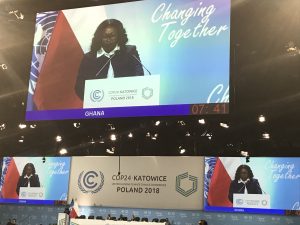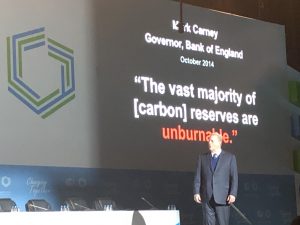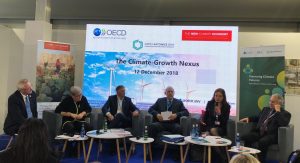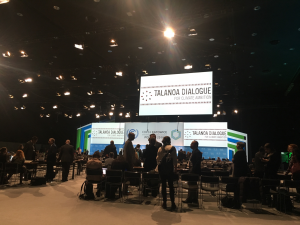Jacob Glasser
Of course, today was another great day at the COP! I had many highlights, including Al Gore’s presentation and my off-the-record meetings with both the US and Korean delegations.
Former Vice President Al Gore’s talk was incredibly uplifting, but also heartbreaking. There was no shortage of horror stories many around the globe are already experiencing because of climate change. It was nice to see someone of Gore’s stature talk about environmental racism and justice, as this is not typically spoken about on such a high level. It was reassuring to hear this on the big stage. Gore ended the talk by saying that, “Political will itself is a renewable resource,” as a hopeful way of looking towards the 2020 US presidential election.

Emily Millar
The highlight of the day, and of the COP so far for me, was Al Gore’s presentation on the necessity to act on climate change. We lined up early to ensure a front row seat and were rewarded with a great view of Gore and the presentation. During the hour and a half talk, he gave an overview of the classic markers of climate change and then delved into more recent and specific examples of how we are being affected today such as the heat waves that stretched across Europe this summer. What I found most enlightening about his presentation was the discussion of how drought led to the Syrian civil war and eventually the current resurgence of populism across the globe. I also spent much of my day attending the closing remarks of the Talanoa Dialogue. This Dialogue, which has been going on for the past year and was meant to facilitate communication and trust between parties, was introduced at COP23. The outcome was viewed quite favorably by parties and many noted how important it is to turn the talks into a substantial agreement. The dialogue was concluded by a Polish and a Fijian child begging the world to act now to protect their future. It was a great reminder of who are truly effected by today’s actions and a great juxtaposition to the average age in the room.
Dieynabou Barry
Today, I got a glimpse into the world of international climate politics at the diplomacy level. Unlike the past days, I attended meetings with only high officials as they presented their views and summaries of their Parties’ stance at the COP. At the closing of the Talanoa Dialogue, many Parties expressed their desire to welcome the IPCC Special Report on 1.5 C and work to increase ambition to reach this temperature goal. Moreover, they emphasized that time is not on anyone’s side and steps must be taken sooner rather than later to move away from the use of fossil fuels. There was a sense of urgency and humanitarian obligation to raise ambition, which is one of the goals of this COP. Parties also voiced their desire to adopt a Paris Agreement rulebook that is substantive to move these goals forward. Not only did the Parties speak on these issues, but we also heard from Business and Industry, youth, indigenous peoples, and women and gender advocates who expressed similar sentiments. With only 2 days left at the COP, the pressure is on to solidify the rulebook, raise ambition, and seriously commit to climate finance. Party delegates are hard at work negotiating and reviewing document text to make sure that their interests are protected and represented. There is also more pressure on the COP24 President to ensure that this COP is a success.

Aashna Aggarwal
A day filled with cool people, great experiences, some alarming statistics but also inspiration. It was great to spend most of the day together with the Duke delegation attending high level meetings and having a conversation with the US delegation about their standing at the COP24 and how it has changed from the previous years. It was interesting to watch the American climate hero, Al Gore, give a ted style presentation about the alarming state of global warming around the world and the need to act right away. I reached my peak moment being in the same room with Patricia Espinoza (Executive Secretary of UNFCCC), António Guterres (Secretary-General of the United Nations), Michał Kurtyka (President COP24) and Jean-Michael Cousteau (President COP23) at the same time. All of these dignitaries addressed the state of emergency our planet was in if we did not take action at an appropriate timing. To quote Antonio Guterres, “Not addressing climate change is not only moral but also suicidal. You might be thinking I am being dramatic but that is exactly what is needed now.”
Rosanne Lam

Day 3. Yet another day that just flew by. Today, I had the opportunity to listen to the famous Al Gore deliver an inspiring, heart-wrangling speech showcasing the detrimental effects of natural disasters. It was particularly reassuring to hear his beliefs and encouraging words that the US has a high likelihood of rejoining the Paris Agreement since its official withdrawal doesn’t occur until after the 2020 elections, on 4th November 2020. Afterwards, the Ministerial Talanoa Closing Meeting

showcased the results of the closed ministerial multilateral discussions. At the closing session of the Talanoa Dialogue, the Presidents of COP23 (last year) and COP24 (this year) presented the ministerial report of the dialogues together. The theme of empathy, unity, and just transition continued to permeate throughout this year’s COP. The Talanoa Dialogue, a program that was launched at COP23 last year, was a program established by the Prime Minister of Fiji, Frank Bainimarama and carried forward by this year’s COP president, Michał Kurtya. The conclusion of theMinisterial Talanoa observed the need for increased multilateral cooperation and climate resilient growth. Both the Fijian and Polish parties emphasized the need for intergeneration equity, sustainable development, and a just transition to achieve the goals of the Paris Agreement and to heed the warnings of the IPCC’s Special Report on 1.5oC. Tonight was the Polish Reception, which was incredible! We were welcomed into Spodek (the UFO-like building) with amazing traditional Polish dancing, delicacies, and great ambiance. The reception was, particularly for the delegates, a great way to decompress from a long week and a half of negotiations with local music, food, and drinks. Particularly touching was the international X’mas tree, where everyone at the COP was invited to sign an ornament and collectively decorate a then-entirely bare evergreen. As week 2 begins to come to a close, the delegates continue tirelessly at the negotiations, some topics achieving more progress than others. The entire day, ministers and prime ministers of each party gave their National Statements calling upon the parties to act. There is talk that, as every year, the negotiations will likely go overtime and continue on over the weekend.

Youngwoo Kim
Time to act
“The Climate-Growth Nexus” organized by the OECD and The New Climate Economy was one of the most impressive sessions in my third day of COP24. Professor Lord Nicholas Stern and Angel Gurria, Secretary-General of OECD, jointly shared their ideas as panelists. Professor Stern pointed out there are huge changes in terms of cost and technology since he published Stern Review on the Economics of Climate Change in 2006.
In principle, the cost of inaction about climate change has always been bigger than the cost of action. And now the cost of inaction has dramatically increased – from damages of historical heat-waves, hurricanes, and floods. On the other hand, the cost of action for climate change – such as using renewable energy – has plunged for the last decade. Actually, the current price of electricity from solar energy is cheaper than burning coal in the US.

Angel Gurria criticized contradictory policies of governments. Governments mention the importance of responding to climate change in the international community, but, at the same time, governments subsidize local companies to construct coal thermal power plants. Mr. Gurria said that Laurent Fabius, president of COP21 in Paris, was creative to make countries sign the Paris Agreement, but we made a target that we do not really want. Furthermore, he emphasized policy implementation to tackle climate change. He talked about how we now have many types of evidence from science and even face huge changes in our lives, but we still do not act consistently.
Molly Bruce
Coffee helps international diplomacy go round. For students, conversations over coffee are a helpful way to get a glimpse into interesting perspectives on the progress of the negotiations. I was able to catch up with an old college friend who has come to COP as a member of the Seychelles delegation, of course, over coffee. While chatting, he and I ran into another delegate. For the next half hour, I had the great pleasure to hear their takeaways from the various negotiating sessions they had attended and to also ask them questions.
One small chunk of this larger conversation centered around the dystopian alliance between the United States, Kuwait, Russia, and Saudi Arabia as well as the rejection of these countries’ approaches. During the weekend between weeks 1 and 2 of the COP, these four climate change boogiemen would not “welcome” the IPCC 1.5oC report. Though obviously a procedural move, this decision stymies the effectiveness and utility of this report to the negotiations. Furthermore, it insulates these four major greenhouse gas (GHG) producing countries from taking responsibility for their role in our world’s projected warming.
For most participants affiliated with the COP and passionate about the need for more aggressive action to mitigate climate change, the United States’ decision to announce its intention to leave the Paris Agreement was devastating. Yet, during last year’s COP in Bonn, Germany, this announcement was merely lingering in the air and implicating a forlorn future. This year, it appears the US has moved from passively opposing many aspects of the climate change negotiations to actively opposing the efforts of other countries to save our planet.
I hope for all our sakes that we can come together as a global community to agree on an effective Paris Agreement Rulebook that takes seriously the dangers indicated by the IPCC 1.5o C report.
